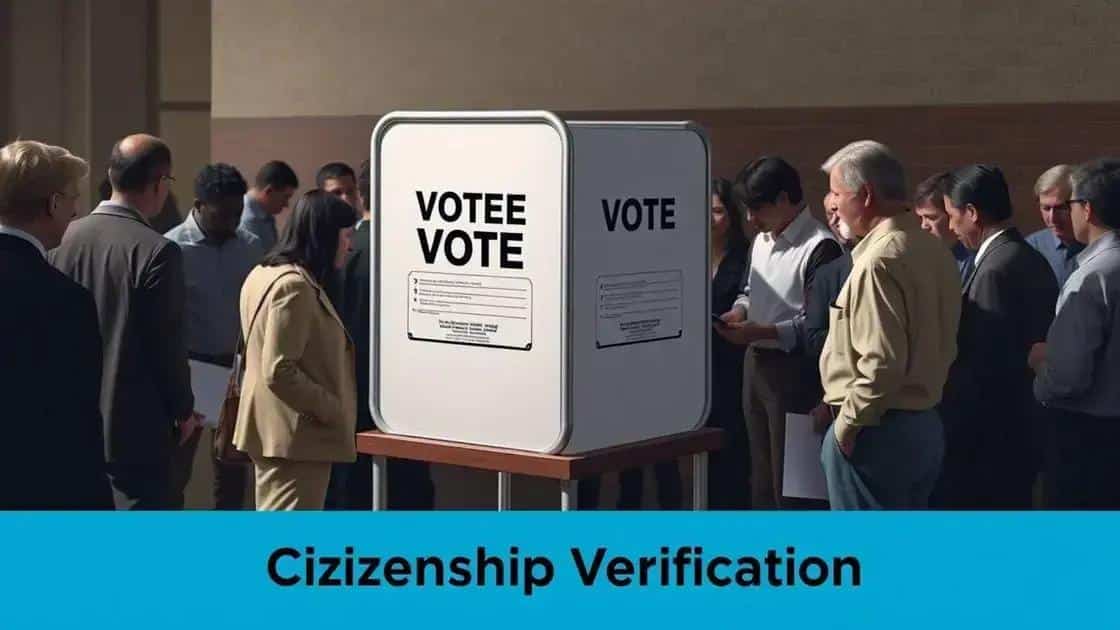New bill passed by House mandates citizenship verification for voting

Anúncios
The new bill passed by the House mandates citizenship verification for voting, aiming to enhance electoral integrity while raising concerns about potential disenfranchisement and impacts on voter turnout.
New bill passed by House mandates citizenship verification for voting is creating ripples across the political landscape. As this legislation gears up for wider discussions, you may wonder how it will impact your voting experience.
Anúncios
Understanding the new bill’s implications
Understanding the new bill’s implications is crucial as it may significantly impact the voting process in our country. This legislation aims to ensure that only eligible voters participate in elections, but it raises questions about accessibility and fairness.
The Goals of the Bill
The primary goal of this bill is to enhance the integrity of our electoral process. Advocates argue that citizenship verification will prevent fraudulent voting. By doing this, they hope to restore public trust in election outcomes.
Anúncios
Potential Benefits
- Improved electoral integrity
- Increased confidence among voters
- Clearer guidelines for voter registration
However, it’s essential to acknowledge that while the bill aims for fairness, it might inadvertently create barriers. For many citizens, especially minorities, the verification process can feel overwhelming and complicated.
Challenges Ahead
Implementing citizenship verification involves various challenges. States will have to develop systems to verify identity while ensuring privacy. There may also be disparities in how different regions enforce these checks.
In addition to operational challenges, there are concerns about the impact on voter turnout. If citizens feel that registering is too complex, they may choose not to vote at all. This could ultimately distort representation in elections.
Conclusion of Implications
In conclusion, while the new bill aims to affirm the democratic process, it is not without its hurdles. Balancing security with accessibility will be vital as this legislation is rolled out.
How citizenship verification works
Understanding how citizenship verification works is essential to grasp the new bill’s impact on voting procedures. The process involves confirming an individual’s citizenship status before they are allowed to vote. This verification ensures that only eligible citizens participate in elections.
The Verification Process
The citizenship verification process typically includes checking government-issued documents. Voters may be required to present documents like a passport, birth certificate, or a naturalization certificate.
These documents confirm a person’s identity and citizenship. Additionally, states may use databases to cross-check voter registrations against local and federal records.
Methods of Verification
- Document Verification: Voters submit official documents.
- Database Checks: Systems compare information with government records.
- Online Tools: Some states provide online portals for quick verification.
This multi-faceted approach aims to create a reliable system. However, it also raises concerns about accessibility for some voters. For instance, individuals without easy access to required documents may feel discouraged from participating in elections.
Ensuring Accessibility
To address these concerns, some states are implementing measures to simplify the verification process. These include providing alternative documentation options or offering assistance at local election offices. The intent is to ensure that all eligible individuals can meet the verification requirements without undue hardship.
Moreover, public awareness campaigns are crucial. Educating voters about the verification requirements can help increase participation rates. Ensuring easy access to information is key to a successful implementation of this bill.
Potential challenges in implementation

Identifying the potential challenges in implementation of the new bill is vital for understanding its real-world effects. While the aim is to strengthen voter eligibility checks, several obstacles can arise during the rollout.
Technical Issues
One major challenge is the technology required for effective verification. States may need to update or create new systems for handling citizenship verification data. This can lead to delays and increased costs as jurisdictions navigate the complexities of newer technologies.
Public Awareness and Education
- Many voters are unaware of the new requirements.
- Education campaigns are necessary for informing citizens.
- Public confusion could lead to lower voter turnout.
Furthermore, public awareness plays a significant role. If voters do not understand the verification process, they might find it challenging to provide the necessary documentation. This could hinder their ability to participate in elections, leading to frustrations and significant declines in voter turnout.
Societal Impacts
Another concern is the possible societal impact of the new measures. Certain groups may find it more difficult to provide proof of citizenship. This is especially true for low-income individuals or minorities who may not have easy access to required documents.
The implementation may also spark debates about fairness and equality in the electoral process. If some citizens face hurdles, it leads to questions about whether the system truly represents the population’s will.
Additionally, there could be legal challenges as groups may contest certain aspects of the bill in courts. This could delay the implementation and lead to uncertainty among voters.
Responses from political leaders
Responses from political leaders regarding the new bill mandating citizenship verification for voting have been diverse. Some leaders support the bill passionately, believing it will ensure a fair and trustworthy electoral process. They argue that verifying citizenship protects the integrity of elections and boosts public confidence in democracy.
Support from Proponents
Proponents of the bill often emphasize that clear verification can prevent voter fraud. They claim that the legislation is a necessary step to maintain honest elections and ensure that only eligible citizens participate in the voting process. Supporters also assert that with modern technology, these checks can be carried out quickly and efficiently.
Concerns from Opponents
- The bill may disenfranchise eligible voters.
- It could create unnecessary barriers to casting a ballot.
- There is a fear of increased bureaucracy.
On the other hand, many political leaders express deep concerns about the potential negative impact of the legislation. Opponents argue that requiring citizenship verification may disenfranchise eligible voters, especially among marginalized communities who may lack proper documentation. They caution that the bill could create unnecessary barriers that discourage participation in the electoral process.
Calls for Compromise
Some leaders advocate for a middle ground. They suggest that while verifying citizenship is important, the process should be accessible and straightforward. These leaders propose that ensuring all eligible voters have adequate means to prove their citizenship would make the verification process fairer.
This approach aims to balance security in elections with the need for an inclusive electoral system. Political leaders are calling for careful consideration and dialogue about how to implement the bill effectively without diminishing voter rights.
Impact on voter turnout
The impact on voter turnout due to the new citizenship verification bill is a crucial aspect to consider. Changes in voting laws can significantly affect how many people choose to participate in elections. With the introduction of verification requirements, many are wondering how that will play out during upcoming elections.
Concerns About Disenfranchisement
One major concern is that the verification process may disenfranchise eligible voters. Individuals who are unaware of the new requirements or who have difficulty obtaining the necessary documentation may feel discouraged from voting. This can lead to lower turnout, especially among marginalized groups.
Potential Barriers
- Access to required documents can vary significantly.
- Voters might experience confusion about the new process.
- Long lines and wait times at polling places could deter participation.
Access issues create barriers for many. Some voters may not have easy access to important documents required for verification. If proving citizenship becomes complex, many eligible voters might opt out of participating, resulting in significant declines in voter turnout. Furthermore, public confusion about the verification process can lead to increased anxiety about voting.
Historical Context
Historically, major changes in voting laws have led to fluctuations in turnout rates. For instance, stricter ID laws in different states have often been linked to lower participation rates. Understanding these patterns is essential for evaluating the potential consequences of the citizenship verification bill.
Many advocacy groups are already concerned about the potential reduction in turnout, as they strive to educate voters on the new requirements. Their efforts focus on providing information and resources to help ensure that everyone can vote.
In conclusion, the new citizenship verification bill aims to strengthen the voting process and ensure that only eligible citizens participate in elections. However, it also raises important issues about access and potential disenfranchisement. As political leaders express their varied views, the real impact on voter turnout remains a vital concern. Effective implementation requires balancing security while making the process fair and accessible for all. As we move forward, it is crucial to monitor how these changes affect voter engagement and to ensure that the democratic process remains inclusive for everyone.






